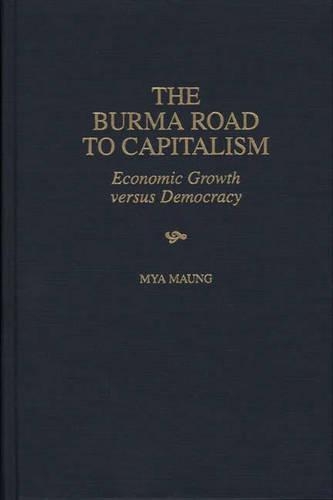
The Burma Road to Capitalism: Economic Growth versus Democracy
(Hardback)
Publishing Details
The Burma Road to Capitalism: Economic Growth versus Democracy
By (Author) Mya Maung
Bloomsbury Publishing PLC
Praeger Publishers Inc
27th August 1998
United States
Classifications
Tertiary Education
Non Fiction
Constitution: government and the state
330.9591
Physical Properties
Hardback
320
Width 156mm, Height 235mm
680g
Description
In light of recent debates and studies on what political scientists call developmental authoritarianism and what some economists consider the East Asian model of economic growth, this book analyzes and evaluates Burma's economic performance under military management. It considers the relationship between democracy and economic growth, especially the thesis advanced by Asian authoritarian leaders that sociopolitical stability and discipline must be established as a prerequisite to economic development. Based upon empirical and historical facts, the book shows that the present military regime's denial of democracy to the people and its ostentatious economic reforms have not promoted real economic growth and human development in Burma. That regime, the State Law and Order Restoration Council (SLORC), consists of poorly educated power-driven rulers. The book underscores that Burma's lack of economic development, despite its rich natural resources, lies in the regime's misuse of both human capital and those natural resources. They have depressed the country's social capability for past, present, and future economic development.
Reviews
.,."comprehensive and well written....Useful to graduate students and policy makers interested in economic development in general and Burma in particular."-Choice
...comprehensive and well written....Useful to graduate students and policy makers interested in economic development in general and Burma in particular.- Choice
His two previous volumes, The Burma Road to Poverty (Praeger, 1991) and Totalitarianism in Burma: Prospects for Economic Development, along with the current one, are books to which one must turn for readily available information on the continuing inextricable nexus between politics and economics in that tragically mismanaged and misgoverned country.- The Journal of Asian Studies
Using Burma as an example, the author argues that a country's course of development is determined, not by its initial conditions, but the quality of its national economic management.- Abstracts of Public Administration, Development, and Environment
..."comprehensive and well written....Useful to graduate students and policy makers interested in economic development in general and Burma in particular."-Choice
"Using Burma as an example, the author argues that a country's course of development is determined, not by its initial conditions, but the quality of its national economic management."-Abstracts of Public Administration, Development, and Environment
"His two previous volumes, The Burma Road to Poverty (Praeger, 1991) and Totalitarianism in Burma: Prospects for Economic Development, along with the current one, are books to which one must turn for readily available information on the continuing inextricable nexus between politics and economics in that tragically mismanaged and misgoverned country."-The Journal of Asian Studies
Author Bio
MYA MAUNG is Professor of Finance in the Wallace E. Carroll School of Management at Boston College. He has done extensive empirical research and written several articles on Burma and other developing countries. He is the author of The Burma Road to Poverty (Praeger, 1991) and Totalitarianism in Burma: Prospects for Economic Development (1992).
